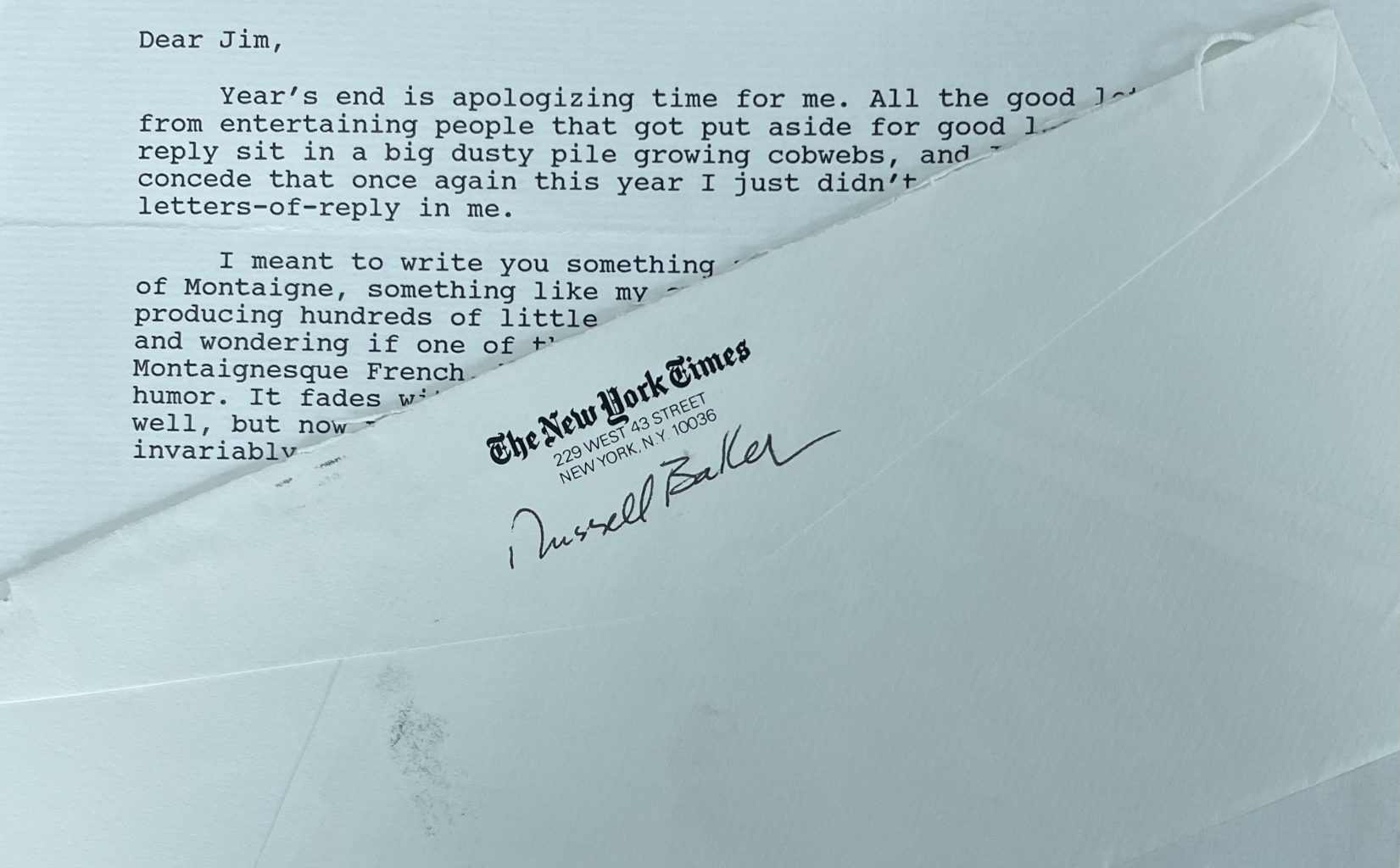Old Letters
A note from Russell Baker.

I’ve always wanted to keep a large correspondence, animated with letters from friends and strangers, immersed in a to-ing and fro-ing of ideas, events, writerly insights and readerly pursuits. And for a long time I did, although I confess I am only now coming to realize this as, in a desultory way, I sort through several stray boxes of papers that survived last year’s downsizing from our home of twenty-five years to our present apartment. What they hold is lots and lots of letters, most dating from my time running A Common Reader, the book catalog I co-founded in 1986 and ran for two decades. There are letters from readers of every stripe, and from writers as well: flipping through the files labeled A and B, I see notes from not-yet-novelist André Aciman, the productivity guru David Allen, Jennifer Armstrong (author of a book about Sir Ernest Shackleton, Shipwreck at the Bottom of the World, whose genesis she traces, bless her, to discovery of an earlier book on her eventual subject in our catalog), novelist Nicholson Baker, Otto Bettmann (founder of the eponymous image archive), serial visionary Stewart Brand, conductor Philip Brunelle, and others.
I was especially happy to find an exchange of letters—and even notes back and forth on a packing slip, on which we bantered about particular titles he’d purchased—with long-time New York Times columnist Russell Baker. Unearthing this exchange brought delight for two reasons. First, because it recalled the occasion of our meeting: a dinner in the summer of 1992 at the Nantucket home of Jean and David Halberstam. We’d been invited to visit because of Margot’s culinary friendship with Jean, and one of the highlights of our short stay was the dinner Jean lavished on for the four of us, plus two additional couples: the Bakers (Russell and Mimi) and the Conroys (Frank and Maggie). Bookseller that I was, the table seemed set for me with volumes among the cutlery, from our host’s The Best and the Brightest to Frank Conroy’s Stop-Time to Baker’s Growing Up, which had garnered its author his second Pulitzer Prize a decade earlier. The food was splendid, the conversation animated and amusing, the welcome of a young couple into a coterie of old friendships warm and genuine. Graciousness came in with the island tide.
Second, because it reminded me of Baker’s friendly, funny tone. Upon returning to my office, I’d sent him, at his request, the latest issue of A Common Reader, thanked him for recommending a book I’d been quick to read, and mentioned M. E. Screech’s new translation of the Essays of Montaigne, which had recently been published (the French sage had somehow seasoned the talk during the fish course). Four months later, as Christmas approached, I received the following reply:
Dear Jim,
Year’s end is apologizing time for me. All the good letters from entertaining people that got put aside for good letters-of-reply sit in a big dusty pile growing cobwebs, and I finally concede that once again this year I just didn’t have many good letters-of-reply in me.
I meant to write you something about Screech’s translation of Montaigne, something like my own translation of Montaigne producing hundreds of little screeches from my French professor and wondering if one of them had grown up glibber than I in Montaignesque French, but I have lost the touch for sophomore humor. It fades with age. Until a few years ago I did it rather well, but now the result when tried in the newspaper is invariably embarrassing.
I have been collecting all year for a Norton anthology of American humor. A depressing task (though, being a scissors-and-paste job, not half as depressing as having to write one’s own book). Humor, I find, wears out its welcome faster than an Alumni Association fund raiser. After 20 minutes of conscious humorseeking, the hunter is powerless to summon the feeblest grin, the sickliest smile. Even Perelman palls after 5,000 words. One begins to notice that Mark Twain is straining desperately, that O. Henry is recycling old tricks, in short that all one’s superiors are not so superior after all. But of course they are. It’s only the obligation to read them that spoils them for the hunter, as the 9th grader’s obligation to read “As You Like It” spoils Shakespeare for him for years to come.
Enough. God bless us every one, especially book folk.
That seems a good sign-off for this post.
